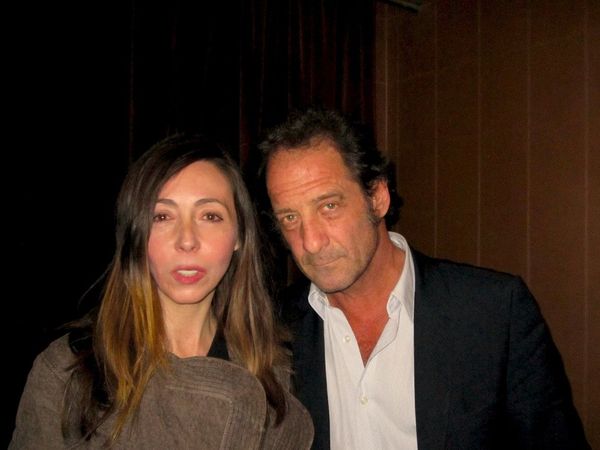 |
| Vincent Lindon with Anne-Katrin Titze, on Robert Mitchum: "He is my favorite one." Photo: Ed Bahlman |
Vincent Lindon, who took home the Best Actor Award at the Cannes Film Festival and a César for his performance in Stéphane Brizé‘s The Measure Of A Man (La Loi Du Marché) co-written with Olivier Gorce, had recently starred in Alice Winocour's enticing and spirited Augustine and Claire Denis' sinister and irradiating Bastards (Les Salauds).
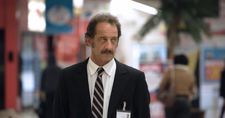 |
| Vincent Lindon as Thierry: "By Skype, it's the most humiliating way of finding a job." |
Gary Cooper's style by G. Bruce Boyer and Maria Cooper Janis, Michael Almereyda's Milgram Experimenter, the Hays Code, Frank Capra, Robert Mitchum and Raoul Walsh, a scene with Karine de Mirbeck and Matthieu Schaller, interviews by Skype and what it means to be able to look at oneself in the mirror in life and as an actor, are weighed with Vincent Lindon, the afternoon before I moderated the US theatrical premiere post-screening discussion for The Measure Of A Man at Lincoln Plaza Cinemas.
Thierry (Lindon) is out of work and struggling with the law of the marketplace, the often cruel humiliations that seem to have become commonplace when looking for a job. A hellish Skype interview, a visit to the bank that informs him that he might be more valuable to his family dead than alive, the fact that his son's education at a special needs school might have become too expensive - the world seems to be closing in around him. Every detail is under examination, from the mini-microwave in the mobile home he is trying to sell to the "amiability percentage" given to him by participants in a futile jobseekers' workshop.
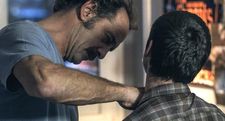 |
| Thierry with his son (Matthieu Schaller): "We are not going to tell you what we're thinking, we are just going to shoot the story." |
Brizé‘s film is about work and the dignity that comes with it. Truth is malleable and words are cheap when a family needs to be fed. Lindon's performance is of such steady force that we are offered to cling to the drowning man. Even in the most dire circumstances there are moral choices to be made. You can give up or fight, lose dignity and regain it.
In 2012, Vincent told me that for him, a film only works if what happens is believable. Alain Cavalier's Pater is one of Tribeca Film Festival Artistic Director Frédéric Boyer's favourite performances by the actor. The Measure Of A Man cuts through the lies of convenience, those blatant lies that regulate so many a workplace.
Anne-Katrin Titze: In 2012 we spoke about Gary Cooper.
Vincent Lindon: I know. And I met his daughter [Maria Cooper Janis], I told you.
AKT: Yes, so did I. It was in connection with the fashion book Gary Cooper: Enduring Style. One of the things I love the most about Thierry in The Measure Of A Man is that he doesn't make anything worse. There are so many movies where a character is in a terrible situation and then he starts drinking and self destructs. Thierry does not do that.
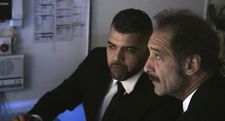 |
| Security agent (Rami Kabteni) with Thierry: "If I stay here, I accept and I become like them." |
VL: No! He wants to stay in his house. He tries to climb up in his kitchen and wash the cabinets, everything. He wants to work. He wants to do something, whatever but do something - to shave in the morning, help his son to get dressed, make breakfast and try to help people, to be here and ready for something. Like a champ, you're ready for the competition. When the time will come, he'll be there. That's what I like. He has a lot of dignity. A lot of courage.
That's true what you say, very often when somebody is going down, then he starts drinking, taking drugs. It's a nasty way of showing that somebody goes bad, to make him do things that are bad. I am like you - you can feel bad and just stay in your house on your couch and prepare dinner. You're still very weak in your head, it's not a problem. We have that in France all the time: You have a job, you lose your job, you get divorced and then blah, blah, blah, the guy goes to the bar and has a whiskey and then a smoke and takes drugs and is going down down down down down. And that puts the audience in a situation that is very complicated - we, all of us want to help the guy and say come on, please, you are not going to do that!
They play with our heart, with our emotion, they play to the misery, emphasise the misery. It's like putting sad music on a bad mood.
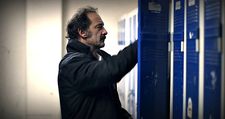 |
| Thierry: "They erase you! You are nothing! Like being on another planet." |
You want to say to the musician, "I'm going to cry, don't worry. If you put sad music there, I'm not going to cry." One plus another one is too much for me. I'm not stupid, let me think and make my own decision. If you give me an order - Think that! - This one is the good one, this is the bad one! - I don't like it when a movie gives me an order. I like when a movie tells me a fact: This is what is happening in France right now, in Italy, in Germany, in the United States. It is not a documentary, it is with an actor, it will be a fiction. He has a wife, he has a son, this is his story. We are not going to tell you what we're thinking, we are just going to shoot the story. Then decide, wake up, think - that's what I like.
AKT: It is not so important the question what does he feel, but what does it feel like? It is at the same time the story of an individual that is so precise that it can stand in for so many people. The film captures both, the story of the man and the big picture. You were talking about being pushed to emotions.
One moment in the film made me cry and that was when you were happiest. You are dancing and laughing with your wife [Karine de Mirbeck] and your son [Matthieu Schaller] is clapping. I was so happy and it made me cry at the same time, because this is what it's all about - that moment. Do you feel that way about this moment?
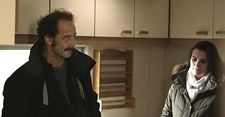 |
| Thierry with his wife (Karine de Mirbeck): "He tries to climb up in his kitchen and wash the cabinets, everything." |
VL: There are three moments that I really love - I love the movie anyway - but that moment is very high on my list. There is another one when I sell my mobile home. My needs have a limit. There is a level when I say stop, I don't sell anymore. My wife [tries to convince me] and I say, no, I'm the father, I'm the man - it's my mobile home and nobody speaks to me like that, never. Why do I like that? Because the guy in front of me, he's not a bad guy. He is not a powerful man. He has been trying to save money for 20 years to buy that. $200 for him is the same as for me! It is two people at the bottom of society who fight with each other. And in the meantime, all the rich people …. [Vincent rubs his hands together]. Fight, small dogs, fight!
AKT: It'll keep you busy!
VL: Exactly! Let me keep you busy, fight! We're going to kill you, don't worry. That's why it's a very, very good scene for me. Another scene I really like is when everyone around me is telling me what I do wrong or not wrong in order to get a job. It's terrible because everybody goes further than they think. It's like an experiment - they are all against me. They forgot that they are like me. They did an experiment a long time ago - they took somebody to torture an other one.
AKT: Milgram. You are talking about Stanley Milgram's experiment.
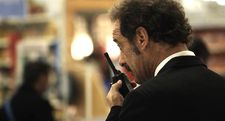 |
| Thierry on the walkie-talkie: "I can't be a witness of what's going on around me …" |
VL: Yes! You can do what you want with people, that's terrible. And there you have seven people around me who can't wait to say what Thierry did wrong. I remember when I was shooting this scene and I decided without talking to the director to play it like that. [He sits upright, not crouched]. Because I am strong. It's a way of saying to them - you are like me, go ahead, stupid asshole, you are shooting a bullet into your own face. It's like ping-pong. Maybe you are going to notice that we are the same. You are speaking about yourself. Be nice! We are all in the same boat. So I decided not to smile, just to be listening.
AKT: I actually put together the two scenes you just mentioned in my notes. Both the shelf [in the mobile home] to your "amiability" are questioned. What is so heartbreaking is that every detail is under examination from strangers - the shelf in the mobile home to the way his voice sounds on Skype. It is the all-round critique - it is open season for him. Everybody seems to be willing to attack the smallest things.
VL: There is another thing that is terribly cruel. Have you ever tried to find a job by Skype?
AKT: No.
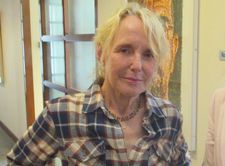 |
| Claire Denis on Marco, portrayed by Vincent Lindon in Bastards: "So from a sort of hero he becomes a victim." Photo: Anne-Katrin Titze |
VL: I'm going to tell you something. To find a job is very difficult. When you don't have a job, you are weaker. It's like boxing, when you lose by a KO two days before, it's difficult to climb up again into the ring. By Skype, it's the most humiliating way of finding a job. The peak of the suffering is not when you are speaking, it's not when you hear the other one asking you about your abilities. It's not when they say you have to wait two weeks to hear from us - that's terrible. The peak is when it stops and there is this noise [he makes the sound of sucking the air out of something]. They erase you! You are nothing! Like being on another planet. You are nothing!
AKT: That's why I don't do interviews on Skype or phoners. I only do interviews in-person. There is another moment in the film I found very disturbing. When Giselle, a worker at the supermarket, celebrates her retirement.
VL: I love it.
AKT: Thierry just arrived at the job. There is this woman who had "32 years of smiling to customers" and "12 years at the meat counter". It is such hell. This is as good as it gets? The worst is the insincerity of the boss who hardly knows her. I believe this is something many people can identify with in all kinds of situations.
VL: And the human resource director. When he starts saying they don't know who she is, maybe she has problems, she has a son. That's all bullshit! The guy is working for all those supermarkets, so he is on their side. He tries to manipulate everybody. Thierry is getting that. At the end he puts the walkie-talkie on the table and he goes away. I prefer not to work than to be there. I remember what Stéphane said to me after we did the scene. What I like in that scene is that Thierry chooses between two suicides. he chooses the social suicide instead of a human-being-shame suicide.
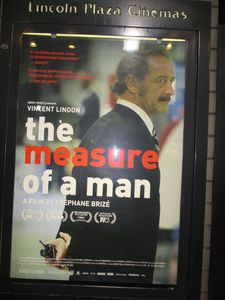 |
| The Measure Of A Man poster at Lincoln Plaza Cinemas in New York Photo: Anne-Katrin Titze |
AKT: He can still look at himself in the mirror.
VL: Exactly. He prefers not to work and find a way to buy meat and vegetables and bread for the family. We'll see. Even if I have to ask in the street. But I can't be a witness of what's going on around me, because it's impossible. If I stay here, I accept and I become like them. And if I accept that, that means that I am going to get dirty money. And I can buy nothing with that money because it's like stolen money. It's against my thinking, my ideology.
AKT: Did you do research with the security guys? Did you go to work with them?
VL: No, because I am a very special actor. I say that because I have nobody to help me. I drive my scooter. I go and do the market. I don't have any car with dark windows. I don't have a secretary. I don't own my apartment. I am just like John Doe. So I know those people. I know how they move. I know how to do that guy who is working at the bar [he points to the bartender at the Soho Grand Hotel cleaning a glass behind me]. I know how he moves. I know how to serve because it's my life. I am always outside. So, no, I never worked with those guys, I just go into my big bag and I try to find things.
AKT: When I was speaking with Claire Denis about Bastards, she was saying that your character was at the beginning, at the core of that film and that it is about a man who thinks he knows what he is doing and then he doesn't. In a way, The Measure Of A Man shows the exact opposite direction.
VL: The opposite, yeah.
AKT: He is lost and then finds himself?
VL: You are right. it's not a question and I couldn't answer better than you said it. Sometimes, your question … just say it's my answer.
 |
| Vincent Lindon on Thierry: "That's what I like. He has a lot of dignity. A lot of courage." |
AKT: Okay, I will put that in. You were talking about the confrontation in the mobile home - we are on your side, on Thierry's side, because we have known you for 20 minutes. The taking sides does take place because we have an individual, we have you, to hold on to. Which is also true for the entire film - you as an actor make it clear that this is not a documentary. Being an actor allows you to transcend that.
VL: Exactly! No, that's really, really clever, exactly. if you make a documentary, it's going to be a very good documentary but afterwards, you shut off the TV and go to bed. The next day, you say, hey you should go on the net and look for it. I've seen something, very good, about the difficulty of a man out of work and then he finds work and it's difficult for him to work there. And I will say, yeah, very nice, I will see it. When it's fiction and you have a well-known actor, there's more …
AKT: … to hold onto?
VL: Yeah, and it's more sexy. There is more emotion. If you see a documentary, you are shocked but you don't cry because it's a documentary. If it's a movie, you become me. Or your husband can say, you see, darling, it's me. And then you can cry. It's another way of showing what is happening in our world at that time, on this day in this year. I think movies are very important when they can jump from the culture pages to the society pages, when they are a kind of witness. Look, that's the state of the world in France, it was like that in 2016.
For my children or grandchildren in 40 years. 4 and a half million people without work - it was like that! All big movies have something behind - Frank Capra's movies are about the 1929 crisis. It's not for nothing that we say, it's a Pre-Code [Hollywood] movie, before the Hays code, after the Hays Code, before 1968, after 1968, before or after Woodstock, before or after the Vietnam War, it's the Fifties, the Sixties, the Seventies, it's a Nixon movie, it's an Edgar Hoover movie.
AKT: The point is that we categorise movies that way?
VL: No, that good movies show us something about the time when they were shot.
AKT: Last time we spoke about Raoul Walsh. I could see Robert Mitchum in your role.
VL: He is my favorite one. See you tonight!
Vincent Lindon is going to be Auguste Rodin in Jacques Doillon's upcoming picture on the artist's life and work.





















